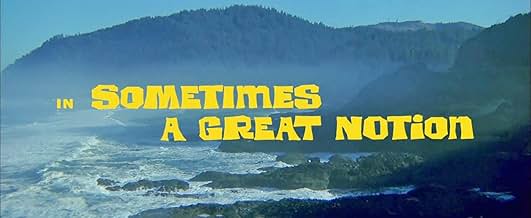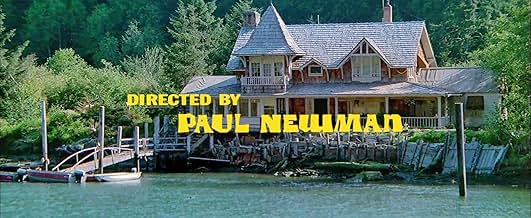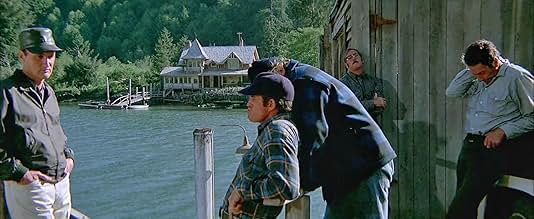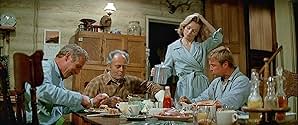NOTE IMDb
6,9/10
4,8 k
MA NOTE
Une famille de bûcherons de l'Oregon farouchement indépendants se bat pour maintenir à flots l'activité familiale en des temps de changement.Une famille de bûcherons de l'Oregon farouchement indépendants se bat pour maintenir à flots l'activité familiale en des temps de changement.Une famille de bûcherons de l'Oregon farouchement indépendants se bat pour maintenir à flots l'activité familiale en des temps de changement.
- Nommé pour 2 Oscars
- 2 nominations au total
Avis à la une
A terrific view of life in the late 60s early 70s northwest, before tech moved in. An early Alaska- if you wanted to survive you logged, farmed, fished or worked for Boeing or Kenworth. I had to watch this as a school assignment and was never sorry for it. There are some clumsy moments which I think a movie fan is able to overlook. Sarrazin was kind of an odd addition but wasn't that much of a distraction. I especially liked Jaeckel's role as the comedian. Newman was, well Newman. Pretty much good regardless, as was Fonda. Anyone in the northwest that hasn't seen this should give it look, though it may be hard to find.
Unfortunately, as much as I love Paul Newman as an actor, the movie version of Ken Kesey's incredible book could have used a more seasoned director for its translation to the big screen. The perfect cast (the book even mentions Hank Stamper as looking like a muscular Paul Newman!), and some great performances (Fonda, Jaeckel, Remick), but the story just doesn't come across on film the way it should. I remember the first time I saw this movie was in the late 70's on TV (Portland's KPTV-12). It was so chopped-up for television that the story, character motivations, and ending made no sense at all to me. I loved Kesey's book "Cookoo's Nest" so read the novel of "Sometimes" to try to make some sense of what the story was all about. The book was an amazingly nuanced work of fiction with a great deal of depth and under-story (reading between the lines); none of which I saw on the TV screening. I later rented the video but even with the unedited version of the film, I found the story very lacking and barely comprehensive. I've recently watched the rental again (2005) and found more in the film than I had remembered, but I still feel that unless you've read the book, you can't truly understand what this movie and the character motivations are all about. They're just barely eluded to in the film version. In spite of all that, it's still a worthwhile movie to watch. If nothing else, it chronicles some great, authentic-looking logging footage. If you can, however, read the novel first and then catch the film. Also, if you ever make it to Newport, Oregon, visit the harbor bar "Bay Haven" where the scenes for the "Snag" were filmed. Tell them the old bartender from the "Embarcadero" sent you. ;-)
I have read Kesey's novel several times over the last 30 years or so. While I see some merit in this movie version, I'd like to see someone have another go at it. The movie only captures the novel in broad strokes. It hits the major point (brother returns to hometown to exact revenge on older sibling), but misses a lot of the flavor. I think Paul Newman, Henry Fonda and Lee Remick were perfect, as were many of the supporting cast. But Michael Sarrazin didn't quite do it for me. Maybe it was the hair, idunno. I always pictured a sort of geeky-looking, bespectacled, beatnick-looking guy with scruffy hair, but still fairly short, and sideburns. Sarrazin probably could have pulled it off, but back in the early 70s, actors were into looking like people from the early 70s.
But more to the point, the movie needed more back-story. We needed to see Johah Stamper "heading west" with young Henry and his brother. We needed to see Jonah fail and surrender to the dampness of the Pacific Northwest and desert his family. We needed to see young Henry take charge ("we're gonna whup her") and begin the logging business that becomes the crux of the story. Also missed were a lot of great scenes when Henry and Leland were children (Henry rescuing Leland from the Devil's Stovepipe, for one). Also missed was the passing of narrative from character to character. One small portion of the novel is actually narrated by a dog. The novel is written, mostly, in the first person from various points of view. There is a little second person narrative at the beginning of most chapters that pull the reader out of the story to offer additional flavor for the surroundings. Obviously, a novel needs to be pared in order to fit into the standard movie length. It would have to be a rather long movie, three hours or so, to portray the texture presented in the novel. But I'd like to see another go at it, maybe even starring Paul Newman as Henry.
But more to the point, the movie needed more back-story. We needed to see Johah Stamper "heading west" with young Henry and his brother. We needed to see Jonah fail and surrender to the dampness of the Pacific Northwest and desert his family. We needed to see young Henry take charge ("we're gonna whup her") and begin the logging business that becomes the crux of the story. Also missed were a lot of great scenes when Henry and Leland were children (Henry rescuing Leland from the Devil's Stovepipe, for one). Also missed was the passing of narrative from character to character. One small portion of the novel is actually narrated by a dog. The novel is written, mostly, in the first person from various points of view. There is a little second person narrative at the beginning of most chapters that pull the reader out of the story to offer additional flavor for the surroundings. Obviously, a novel needs to be pared in order to fit into the standard movie length. It would have to be a rather long movie, three hours or so, to portray the texture presented in the novel. But I'd like to see another go at it, maybe even starring Paul Newman as Henry.
The date i don't remember, but the day I do. what i did that day i should say. and the movie is still vividly in my mind. I can see the family interplay pretty clearly, but there is 1 scene clearer then all the others.
And more worried about creating a spoiler,
i will only describe it in general terms.
And that is the Death Scene in the picture, I don't want to mention the players in the scene for fear of spoiling it for others. it isn't a short scene, it felt like an eternity, for me anyway.
It is heart wrenching, and has haunted me all these years.
I would like to see this picture again to feel that emotion again.even now just talking around it i feel emotions welling up in me.
worthwhile movie I would recommend it for anyone.
And more worried about creating a spoiler,
i will only describe it in general terms.
And that is the Death Scene in the picture, I don't want to mention the players in the scene for fear of spoiling it for others. it isn't a short scene, it felt like an eternity, for me anyway.
It is heart wrenching, and has haunted me all these years.
I would like to see this picture again to feel that emotion again.even now just talking around it i feel emotions welling up in me.
worthwhile movie I would recommend it for anyone.
A lot of people seem to be down on this film for reasons I really can't understand. The film seem to stretch everyone's creative levels especially one performer I'll single out later.
Henry Fonda plays the head of the Stamper clan who own a lot of acreage in Oregon timber country and the family business is cutting logs. Enough to survive, but they do it on their own. But a strike by timber union loggers causes enmity between them and the Stampers who are seen as scabs.
There are some similarities between Fonda's character and the family patriarch he played in Spencer's Mountain. But whereas Spencer had a noble dignity to him, Ben Stamper is a dissolute old cuss who has enjoyed all the vices known and imparted a love for them unto his children. They would be half brothers Paul Newman and Michael Sarrazin who've also got issues between themselves that may prevent the Stampers from forming a united front.
Newman directed the film and he had a good eye for the scenery of the Oregon logging country. And he got some good performances from the rest of the cast. One of them Richard Jaeckel got his career role as a Stamper cousin. Newman reached his creative heights in Jaeckel's death scene which was played between him and Jaeckel. It's a long drawn out affair for reasons you'll know if you see the film. It will stay with you forever as it has me since I saw the film when it first came out. Richard Jaeckel got a nomination for Best Supporting Actor and the pity is that he was up against another popular character actor in Ben Johnson who won for The Last Picture Show.
Sometimes A Great Notion also got a second Oscar nomination for Best Song with We're All His Children by Henry Mancini and Alan and Marilyn Bergman. Bing Crosby recorded a fine version of it on one of his albums. It lost however to theme from Shaft.
Paul Newman deserved a lot more credit for this film than he got. I think if you see Sometimes A Great Notion you'll agree.
Henry Fonda plays the head of the Stamper clan who own a lot of acreage in Oregon timber country and the family business is cutting logs. Enough to survive, but they do it on their own. But a strike by timber union loggers causes enmity between them and the Stampers who are seen as scabs.
There are some similarities between Fonda's character and the family patriarch he played in Spencer's Mountain. But whereas Spencer had a noble dignity to him, Ben Stamper is a dissolute old cuss who has enjoyed all the vices known and imparted a love for them unto his children. They would be half brothers Paul Newman and Michael Sarrazin who've also got issues between themselves that may prevent the Stampers from forming a united front.
Newman directed the film and he had a good eye for the scenery of the Oregon logging country. And he got some good performances from the rest of the cast. One of them Richard Jaeckel got his career role as a Stamper cousin. Newman reached his creative heights in Jaeckel's death scene which was played between him and Jaeckel. It's a long drawn out affair for reasons you'll know if you see the film. It will stay with you forever as it has me since I saw the film when it first came out. Richard Jaeckel got a nomination for Best Supporting Actor and the pity is that he was up against another popular character actor in Ben Johnson who won for The Last Picture Show.
Sometimes A Great Notion also got a second Oscar nomination for Best Song with We're All His Children by Henry Mancini and Alan and Marilyn Bergman. Bing Crosby recorded a fine version of it on one of his albums. It lost however to theme from Shaft.
Paul Newman deserved a lot more credit for this film than he got. I think if you see Sometimes A Great Notion you'll agree.
Le saviez-vous
- AnecdotesThis was the first film ever shown on HBO when the service premiered in 1972.
- GaffesIn the fox-hunt scene, when the fox jumps over the fence, it becomes apparent that the fox is wearing a 1/4" black collar with a little tiny bell on it.
- Citations
Hank Stamper: [singing] Don't ever hit your mother with a shovel. It will leave a dull impression on her mind. Paul Newman said the same line in "Butch Cassidy and the Sundance Kid".
- Versions alternativesIn the earliest video release version, circa 1982, when Leland first arrives, a crane shot reveals Hank looking down below at the family reunion. In the most current VHS release, circa 1994, the crane shot is edited out and replaced with just a single cut from Viv, with an audio bridge to Hank on the roof.
- ConnexionsFeatured in AFI Life Achievement Award: A Tribute to Henry Fonda (1978)
- Bandes originalesAll His Children
Lyrics by Marilyn Bergman and Alan Bergman
Music by Henry Mancini
Sung by Charley Pride
Meilleurs choix
Connectez-vous pour évaluer et suivre la liste de favoris afin de recevoir des recommandations personnalisées
- How long is Sometimes a Great Notion?Alimenté par Alexa
Détails
Box-office
- Budget
- 3 660 000 $US (estimé)
- Durée1 heure 54 minutes
- Couleur
- Rapport de forme
- 2.35 : 1
Contribuer à cette page
Suggérer une modification ou ajouter du contenu manquant

Lacune principale
What is the German language plot outline for Le clan des irréductibles (1971)?
Répondre
































